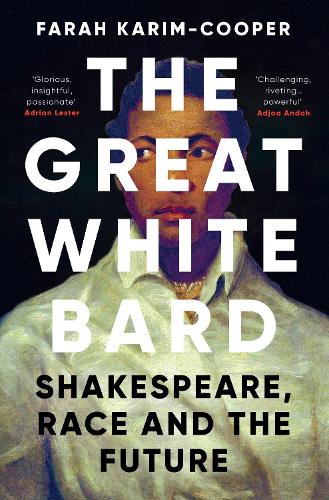
The Great White Bard: Shakespeare, Race and the Future
(Hardback)
Available Formats
Publishing Details
The Great White Bard: Shakespeare, Race and the Future
By (Author) Farah Karim-Cooper
Oneworld Publications
Oneworld Publications
5th September 2023
27th April 2023
United Kingdom
Classifications
General
Non Fiction
Literary studies: plays and playwrights
Social and cultural history
822.33
Physical Properties
Hardback
336
Width 153mm, Height 234mm
Description
As we witness monuments of white Western history fall, students are asking, why should we study Shakespeare How is he still relevant Wasnt he racist Professor Farah Karim-Cooper has dedicated her career to the Bard, which is why she wants to take the playwright down from his plinth and unveil a Shakespeare for the twenty-first century. If we persist in reading Shakespeare as representative of only one group, as the very pinnacle of the white Western canon, then he will truly be in peril. Combining piercing analysis of race, gender and otherness in famous plays from Anthony and Cleopatra to The Tempest with a radical reappraisal of Elizabethan London, The Great White Bard entreats us neither to idealise nor bury Shakespeare but instead to look him in the eye and reckon with the discomforts of his plays, playhouses and society. In inviting new perspectives and interpretations, we may yet prolong and enrich his extraordinary legacy.
Reviews
This glorious book is insightful, passionate, piled with facts and has a warm, infectious love for theatre and Shakespeare running through every chapter. Thank you to Farah Karim-Cooper for underlining the fact that we all have a right to claim Shakespeares work.
-- Adrian Lester CBE'The Great White Bardis conscientiously constructed and vitally important. The book is pitched perfectly for the general reader, and it provides clear and compelling models for how to read Shakespeare with race in mind.'
-- Ayanna Thompson, author of Blackface'Anyone reading the contents page alone of Dr Farah Karim-Cooper'sThe Great White Bardwill havetheir minds blown. Dive in and your whole cultural landscape will be refreshedand reframed. A book of great scholastic yet accessible detail, demanding that we payattention with new understanding to the work of our greatestplaywright, to the staging of that work anditsunacknowledged impact on the 21st-century lives of all of us whounwittingly absorb its cultural norms for good and ill. A challenging, riveting read,The Great WhiteBardreminds us how powerful the stories we tell can be onour lives.'
-- Adjoa AndohShe concludes We all have the right to claim the Bard Amen to that.
-- Daily Telegraph'There are plenty of books on Shakespeare: but this one is different. This is Shakespeare as weve (most of us) never been willing to see him and the works emerge from the analysis as newly complicit, powerful and yet recuperative.
-- Emma Smith'Farah Karim-Cooper has long been at the center of conversations about race in Shakespeares plays, drawing on her experiences as a woman of color, director of research and education at the Globe Theatre, and Shakespeare professor. The Great White Bard is a powerful and illuminating result of this sustained engagement, grappling with how Shakespeare can be reimagined as a playwright who speaks to (and is spoken by) those excluded from the dominant culture. Historically grounded, engagingly written, richly informed by stage history, and always attuned to the "form and pressure" of our time, The Great White Bard could not be more timely.'
-- James Shapiro, author of 1599: A Year in the Life of William Shakespeare'Farah Karim-Cooper's analysis comes from a wide and fascinating perspective. This is an accessible yet scholarly book guiding the reader through essential questions about race, gender and so much more in Shakespeares plays. It is personal, refreshing and necessary. She has helped me reframe and understand Shakespeare in a different way. Read it and learn!'
-- Lolita Chakrabarti OBEA bracing and illuminating read.
-- Bookseller'The Great White Bard is essential reading for teachers, students, practitioners and artists. It makes clear why the exploration of Shakespeares plays must expose the 400-year-old cultural attitudes contained in them if we are to discover their real relevance and resonance. Farah Karim-Cooper has written an important, illuminating and accessible work that invites our active participation in debate about the plays; to interpret and interrogate them, not to venerate. It belongs in every Shakespeare classroom.'
-- Jacqui OHanlon, Director of Learning, Royal Shakespeare CompanyAuthor Bio
Farah Karim-Cooper is professor of Shakespeare Studies at Kings College London, president of the Shakespeare Association of America and co-director of education at the Globe Theatre, where she has worked for over 16 years. She is an executive board member for RaceB4Race, a collective of scholars and institutions that seek racial justice in the field of pre-modern literary studies.
